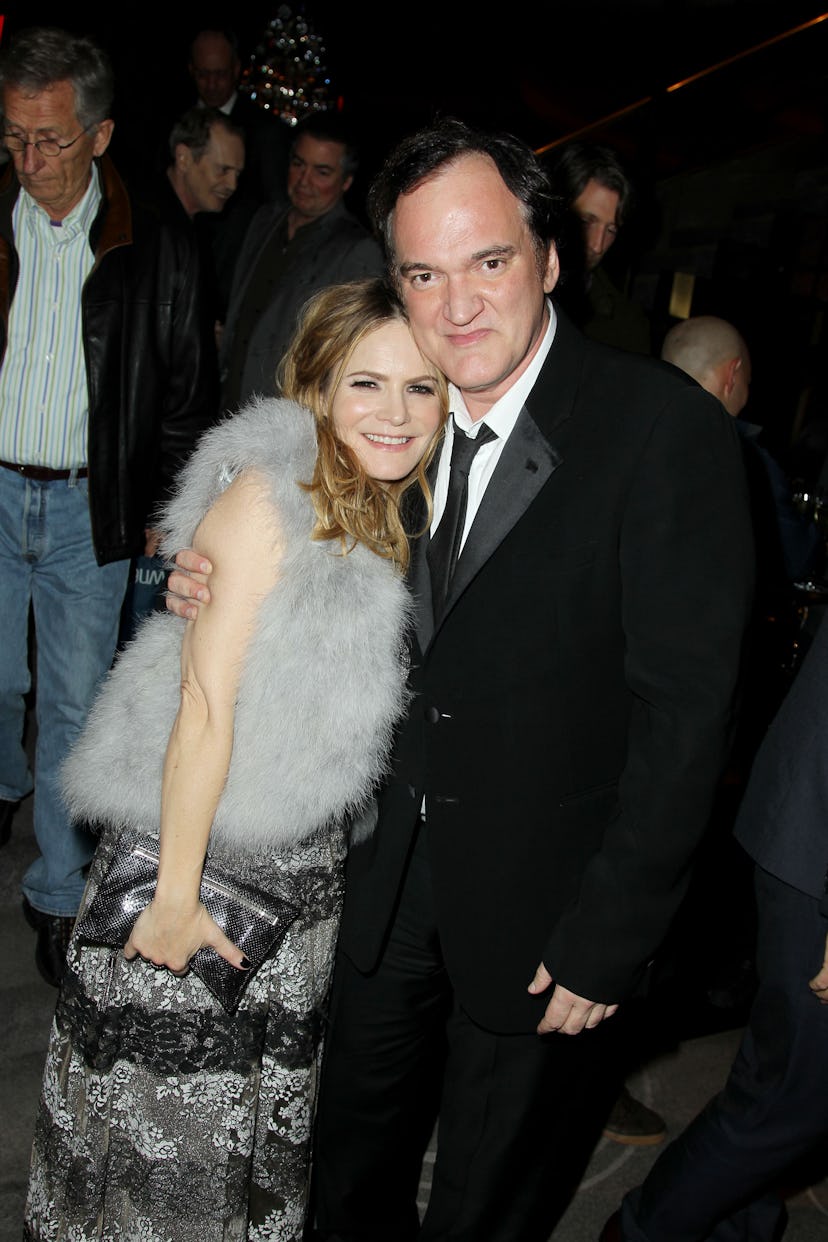Jennifer Jason Leigh on the Politics of “The Hateful Eight”

Jennifer Jason Leigh’s character in Quentin Tarantino’s The Hateful Eight doesn’t do a lot of talking— her Daisy Domergue is too busy getting slugged by her co-stars, namely Kurt Russell, who plays a bounty hunter tasked with getting her to a remote town in Wyoming to get hanged. Yet despite the lack of dialogue, Leigh’s intensely physical performance packs a punch, one that’s already garnered critical attention as well as a Golden Globe nomination, one of two for Tarantino’s eighth. There’s talk she might score what would be, incredibly, her first Academy Award nomination for the part.
“What she did in the film is unlike anything I’ve seen,” co-star Tim Roth said at the New York premiere Monday night. “She’s very, very quiet and shy, but she’s also very thoughtful and quite brave. Incredibly brave.” It’s not her only standout performance this season – she’s also getting notices for Charlie Kaufman’s animated Anomalisa, a part that got Leigh a Best Supporting Actress nomination at the Independent Spirit Awards. A day after the Tarantino premiere, a typically sly Leigh was on the phone discussing the director and her “bad marriage” to Russell.
You’re having a banner year with The Hateful Eight and Anomalisa. Was there a concerted effort to throw yourself back into work? I don’t really feel like I’m being thrusted back into the spotlight. It’s nice that both of these films are getting a lot of press because I love these movies. It’s easy to talk about them. You always have to do press about movies, but you don’t always necessarily love the movies you’re doing press for. It’s a really nice to be talking about movies that I love again and that I’m really proud of.
How did your role in The Hateful Eight come about? I was really excited when I got the call that I was going to read for Quentin. I read the script and loved it, but it was missing the last chapter. So then I go meet with him and he hands me the last chapter and says, ‘Okay, so I’ll leave for a bit, you look it over, and then I’ll come back and we’ll do it together.’ And I wasn’t expecting that at all. It was a little daunting, to say the least [laughs]. But then he did this great thing: when you read for a director, they usually sit across the room from you and watch you while you read with the casting director or a reader, but he came and sat down next to me. He made it so easy. I really, really felt like we were in it together. He was participating in a way that most directors don’t, and it just put me at ease. All you can do is go for it. You might not get it, but at least you won’t leave the audition wishing you had tried harder. You have nothing to lose, except the role [laughs].
What were Tarantino’s intentions with your character? She’s both victim and villain. Are we supposed to root for her or sympathize with her? I think all the characters are hateful, but at the same time you root for all of them in different ways. Your alliances change as you watch the film—it’s fun! A lot of women really like Daisy, which is nice. I never saw her as the villain, because I’m playing her.
__It’s such a physical performance. How did you prepare for the role?__ It was really physical, and also dangerous, but when you’re doing it with Kurt Russell, you don’t feel endangered. He really knows what he’s doing, especially when he throws a punch. I could really feel free to just act. I never anticipated the punch, and therefore I never blew the take. He really instilled confidence in me, because I trusted that he would never injure or hurt me. The chain that ties us together became this really fun thing—it was like choreography in a way. I followed his lead, and he’s a great dancer, so he’s easy to follow.
You have such a great rapport. I know, it’s like a really bad marriage [laughs].
I know that the cast all became so close while filming. You even have a group text. What do you guys text about? Yeah! We do. We text at least once a week. It’s just as simple as where you are in the world right now, something funny that you’re doing, a memory from the movie, pictures of what you’re eating, you know.
The last scene of the movie packs a lot of punch. What can the audience take away from it? I don’t like to impose my own feelings or interpretations on anything because I like everyone having their own, but I find it really moving. I don’t want to say too much more about it, but I do find it relevant to what’s happening today in America. I think it’s ultimately really what the movie is about.